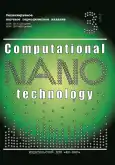Designing a modular automated decision support information system in a digital educational environment
- Authors: Smolentseva T.E.1
-
Affiliations:
- MIREA – Russian Technological University
- Issue: Vol 12, No 3 (2025)
- Pages: 141-151
- Section: INFORMATICS AND INFORMATION PROCESSING
- URL: https://bakhtiniada.ru/2313-223X/article/view/350194
- DOI: https://doi.org/10.33693/2313-223X-2025-12-3-141-151
- EDN: https://elibrary.ru/BPDJWS
- ID: 350194
Cite item
Abstract
In the context of digitalization of education, there is an increasing need for intelligent decision support systems that ensure informed, adaptive and personalized management of the educational process in a digital educational environment. At the same time, the key areas are timely assessment, forecasting of learning outcomes and personalization of educational routes in a digital educational environment. The implementation of these directions is impossible without an intelligent automated information system capable of providing adaptive feedback in a digital educational environment. The purpose of the study is to describe the architecture and modules of an automated decision support information system for implementing adaptive feedback. Unlike known implementations of automated information systems, the proposed project uses a modular architecture that integrates an analytical module and adaptive feedback to support decision-making in a digital educational environment. The description of the modules and the analysis of the implemented solutions in the automated information system of decision support are given. The article implements the design stages with a description of the adaptive assessment sequence diagram, class diagram, and deployment diagram. A functional architecture is built with decomposition by levels of representation in the designed decision support system. The presented draft of the system in the article will ensure the formation of personalized and informational support for the user in the decision-making process in the digital educational environment.
Full Text
##article.viewOnOriginalSite##About the authors
Tatyana E. Smolentseva
MIREA – Russian Technological University
Author for correspondence.
Email: smoltan@bk.ru
ORCID iD: 0000-0003-4810-8734
Dr. Sci. (Eng.), head, Department of Applied Mathematics, Institute of Information Technologies
Russian Federation, MoscowReferences
- Azbel A.A., Ilyushin L.A., Morozova P.A. Feedback in education through the eyes of Russian teenagers. Educational Issues. 2021. No. 1. Pp. 195–212. (In Rus.). doi: 10.17323/1814-9545-2021-1-195-212.
- Aniskin V.N., Aniskin S.V., Bogoslovsky V.I., Dobudko T.V. Designing the electronic information and educational environment of a pedagogical university based on an information-activity approach. Journal Umanitar Modern. 2021. Vol. 4. No. 2. Pp. 5–9. (In Rus.)
- Akhmedyanova G.F., Pischukhin A.M. An ontological approach to the design of scientific and production systems. The Ontology of Design. 2022. Vol. 12. No. 1. Pp. 57–67. (In Rus.). doi: 10.18287/2223-9537-2022-12-1-57-67.
- Vezirov T.G. The digital educational environment of the university as a factor of professional development of the master of pedagogical education. In: Innovative areas of professional training in Russia and abroad. Collective monograph. Ulyanovsk: Zebra, 2024. Pp. 373–387.
- Ivaev M.I., Lapaeva O.S., Novikova D.D. Decision support systems: application experience, optimization problems. Modern Science: Actual Problems of Theory and Practice. 2022. No. 4-2. Pp. 56–59. (In Rus.)
- Smolentseva T.E. Analysis of structural elements of the digital educational environment. Security. Management. Artificial Intelligence. 2024. Vol. 4. No. 4 (4). Pp. 8–11. (In Rus.)
- Smolentseva T.E. Development of an ontological model of multilevel assessment of students' knowledge. Business. Education. Law. 2025. No. 2 (71). Pp. 407–412. (In Rus.). doi: 10.25683/VOLBI.2025.71.1293.
- Smolentseva T.E. Technology of continuous assessment of residual knowledge on the example of stream disciplines of higher educational institutions. Modern Science-intensive Technologies. 2025. No. 1. Pp. 158–165. (In Rus.)
- Smolentseva T.E. Technology of assessment of residual knowledge as an element of the educational environment. Safety. Management. Artificial Intelligence. 2024. Vol. 4. No. 4 (4). Pp. 32–35. (In Rus.)
- Toktarova V.I., Popova O.G. Analysis of educational data on the relationship between learning success and student behavior in the digital educational environment of a university. Informatics and Education. 2022. Vol. 37. No. 4. Pp. 54–63. (In Rus.). doi: 10.32517/0234-0453-2022-37-4-54-63.
- Shmatko A.D., Chabanenko A.V., Stepashkina A.S. Introduction of additive technologies and artificial intelligence technologies into the educational process. In: Actual problems of labor and human potential development: A university and academic collection of scientific papers. St. Petersburg: St. Petersburg State University of Economics. 2021. No. 4 (21). Pp. 15–24.
- Alavi M., Leidner D.E. Knowledge management and knowledge management systems: Conceptual foundations and research issues. MIS Quarterly. 2021. Vol. 25. No. 1. Pp. 107–136.
- Buinevich M., Shkerin A., Smolentseva T., Puchkova M. On the implementation of residual knowledge continuous assessment technology in an educational organization using artificial intelligence tools. In: 4th International Conference on Technology Enhanced Learning in Higher Education (TELE). IEEE, 2024. Pp. 111–114. doi: 10.1109/TELE62556.2024.10605664.
- Ghareeb A.M., Hefny H.A., Darwish N.R. Utilising AHP and PROMETHEE for evaluating the performance of online services. International Journal of Internet Technology and Secured Transactions. 2021. Vol. 11. No. 3. Pp. 307–327.
- Lin L., Dong Y., Chen X. et al. Exploring the impact of design thinking in information technology education: An empirical investigation. Thinking Skills and Creativity. 2024. Vol. 51. P. 101450. doi: 10.1016/j.tsc.2023.101450.
- Ndubuisi G., Otioma C., Owusu S., Tetteh G. ICTs quality and technical efficiency: An empirical analysis. Telecommunications Policy. 2022. Vol. 46. P. 102439. doi: 10.1016/j.telpol.2022.102439.
Supplementary files















